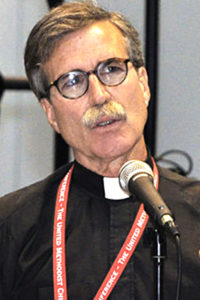Toughen Up
If the United States Supreme Court overturns Roe v. Wade next June (in Dobbs v. Jackson Women’s Health Organization), violent protests across the nation could very well surpass those that followed the May 25, 2020, killing of George Floyd. It is also likely that the fanatical reaction to Roe’s demise, while considerable, would also be exaggerated by the corporate media. Christians in the United States would be wise to recognize this possible challenge and prepare to meet it in ways that are consistent with the Gospel of Life.
One essential way Christians can prepare for pro-abortion hysteria is to recognize and overcome pietism. A Protestant tradition (though it can probably be spotted in Catholic precincts, here and there), pietism began well into the Reformation in response to rationalistic German Lutheranism. Emphasizing a religion of the heart, a life of highly personalized faith, and sanctification to the point of perfection, pietism molded a distinctive character in its adherents. To this day, pietistic thinking, practices, and characteristics linger among Methodists, Wesleyans, Moravians, nondenominational types, and other Christians.
Count Nikolaus Ludwig von Zinzendorf (1700-1760) was a leader in the pietistic movement. He described the ideal Christian character that pietism produced in this way:
Whoever is a true disciple, whoever is a child of God, is kind and obliging; he is a comfort to all and burdensome to none; he never asks much of anyone, but he rejoices when he can do much for another. He easily finds an excuse for his neighbor, should he make a mistake; and if someone begins a dispute with him concerning temporal and spiritual matters, then he always supposes the other to be right. If he is wronged, then he always thinks, haven’t I also done something which makes it my fault? . . . One is removed from all vainglory, from exalting oneself above others, from insisting on being in the right. If one is spoken or written against or opposed, then one is the first among the readers and hearers to help the slanderers and persecutors to the point by which they appear more innocent and equitable, thinking that the accusations were perhaps not without foundation. Indeed, one thinks before another thought arises, by what means did I give occasion for that? ‘Dear Father, do forgive the fault that is mine in that book, in that slander, in that persecution.’ This is always the first thought of a heart which has received grace.
(Lecture I, Moravian Chapel in London, 1746; from For All the Saints: A Prayer Book For and By the Church [American Lutheran Publicity Bureau, Delhi, NY, 1994, first printing], Volume I, pp. 43-44.)
Similar quotations from John Wesley and other early Methodists could be cited.
According to Zinzendorf, the Christian is always humble and self-convicting, never bothersome and self-assertive, never making anyone uncomfortable or angry. So, the Christian always appears retiring and sheepish to others. To be sure, this is a benign picture of Christian character. However, are there not times—for example, when confronted by the deliberate destruction of innocent, defenseless human lives—when a Christian must behave with more determination? Such determined action would be initiated in the service of God and out of love for neighbor.
Consider this example: A Christian citizen, formed by pietism, is confronted on the street by shrill defenders of Roe. More likely than not, he will simply wilt into silence while the abortion advocates’ energy, zeal, and determination dominate and win the day. At best the pietistic Christian will ASAP attempt to change the subject to, say, college football, avoiding the life-and-death issue of abortion altogether. However, is that action—or more accurately, that inaction—truly faithful to Christ? While such a pietist might consider himself holier than thou, his silence in the face of evil comes across as cowardice.
When pressured or attacked by those who are morally untroubled by abortion, the faithful Christian should stand up and give a simple yet firm account of the Gospel of Life, in a thoughtful—and winsome—way. Such a Christian would strap on the armor of God. And stay in the race until its end. After all, the Christian must never, in the name of spiritual purity, retreat from the messiness of disagreement and conflict.
Faced with the destruction of the unborn child, it is more Christian to be outspoken and despised than to be silent and well-liked. There is a time to step up. There is a time to stand firm. There is a time to speak the truth in love. Learn those lessons, and practice for future challenges now—before the tsunami of protest that will surely come in reaction to the collapse of Roe.











Thank you.
Pingback: Life on the Web - January 6, 2022 - Lutherans For Life